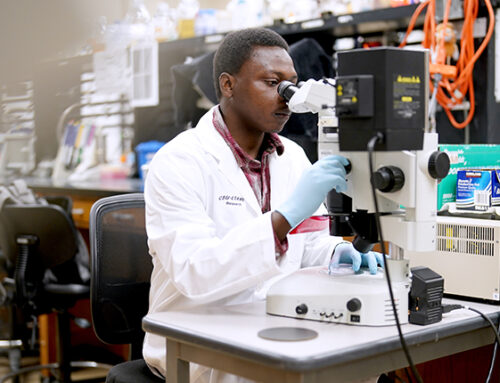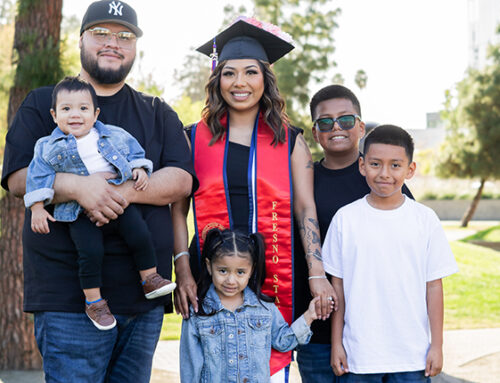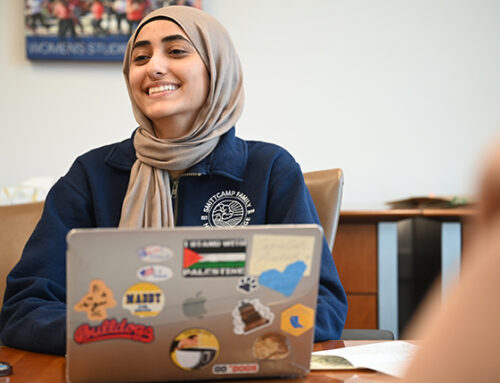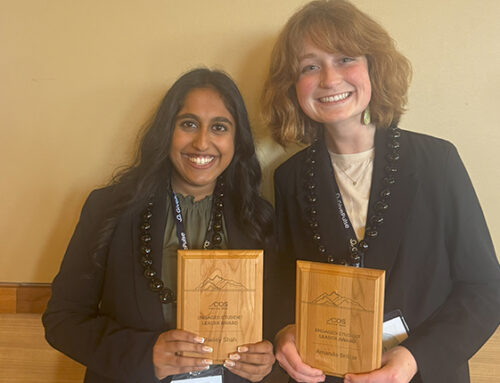Elizabeth Gaw chuckles as she refers to herself as a stereotypical computer science major — quiet and socially awkward.
She had no idea how she would fit in at Fresno State her freshman year, or how she would do in the complicated courses needed for her major.
Gaw considers herself a first-generation student even though her parents went to college. They attended school in the Philippines with limited resources and technology, Gaw said. Math and English were taught at lower standards than in the United States, making it difficult for her parents to help her, she said.
Now a senior who hopes to work as a software engineer or web developer, Gaw credits the Building Opportunities through Networks of Discovery, or BOND, program through the College of Science and Mathematics with setting her on a course for success.
Early results show that BOND students have higher retention rates in science and math than their classmates, are closing the achievement gap, have a greater sense of community and a stronger belief in their ability to be successful.
“Being in this program really helped me open up and gain confidence because it was really hard for me to talk to new people,” said Gaw, who hopes to graduate in the spring. “BOND is about building opportunities. It’s about networking with different people, opening up, finding different resources so even though you’re struggling, you have friends that will automatically help you and be on your side.”
BOND was one of eight programs created on select California State University campuses in 2015 to support STEM majors during their first year of college. It was funded for two years by the Helmsley Charitable Trust.
Now supported through the college, by the Office of the Provost at Fresno State and in collaboration with Student Affairs, the program welcomes 300 students this fall — double the number of participants from previous years. The plan is to grow and serve all incoming freshman.
“Our rigorous and engaging curriculum and programs are designed to best prepare students for a number of exciting and diverse careers,” said Dr. Christopher Meyer, dean of the college. “I have been continually impressed with the well-developed critical thinking and communication skills these students display during their capstone poster presentations at the end of the semester — essential skills for 21st-century STEM careers. Program leaders Mara Brady, Beth Weinman and the rest of the BOND team have done amazing and transformative work!”
The first-year program consists of a two-day summer experience, or orientation, to introduce students to their classmates, to peer leaders, faculty and support staff. Then, during the academic year, students take two introductory courses that expose them to the scientific method, research and community-based activities.
The classes are part of the University’s DISCOVERe Mobile Technology Program, using tablets for an enhanced learning experience. This allows students to collaborate and share information in class.
The last component of the program includes the Advising and Resources Center, which works closely with faculty to connect students with support services such as academic coaching, the career center and the Learning Center rather than leaving students to figure it out on their own.
“Science is not a straightforward path. It’s challenging. It’s complicated,” said Mara Brady, assistant professor in the Department of Earth and Environmental Science. “There are going to be struggles, but with the right strategies and the right support, you can be successful.”
“The goal is to keep more students in science and math, especially the ones that really could be successful but were discouraged their first year and felt like they didn’t belong,” she said.
Early analysis of the program show that students in BOND are nearly three times more likely to remain in science and math majors than those not enrolled. About 52 percent of the BOND students who entered Fresno State as CSM majors remained in science and math two years later compared to 42 percent of the control group or non-BOND students, according to the Office of Institutional Effectiveness.
When compared to the control group, BOND students are also taking more science-related coursework toward their degree and are accessing more student support services their freshman year. What’s even more significant, program leaders say, is a closing of achievement gaps for first-generation students and those traditionally underserved by CSM compared their more privileged peers.
“What we have is a learning community where faculty and staff, professional advising staff work together inside and outside of the classroom so we can support each other in many ways to provide crucial information that students should know during their first semester,” said Jaime Arvizu, director of the Advising and Resource Center.
Former BOND students also play a role, returning as instructional support assistants in classrooms to bridge the lines of communications between faculty and students. Gaw has returned for a second year as a student assistant.
“I’m very glad to be helping because my first year, I had no idea what college life was about,” Gaw said. “I struggled a lot in my first year so having this program really helped.”





